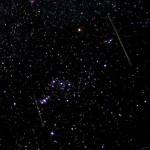The annual Geminid meteor shower is one of the most reliable annual meteor showers. The shower is noted for a steady stream of bright meteors with rates of well over 100 per hour.

The shower peak is predicted for December 14th, at around 18:00UT (14Dec 08:00HST). For viewers in the central Pacific this favors the evening of Dec 13th into the morning of Dec 14th, starting around 8pm as Gemini rises in the east. The peak is broad, with near peak rates occurring a day either side of the maximum, thus allowing everyone with a dark sky to enjoy this event. Thus the evening of the 14th may also provide a good viewing opportunity.
Even from more southerly sites, this is an excellent stream of often bright, medium-speed meteors, a rewarding event for all observers, whatever method they employ. The peak has shown slight signs of variability in its rates and timing in recent years, with the more reliably-reported maxima during the past two decades (HMO, p. 171) all having occurred within λ⊙ = 261.5° to 262.4°, 2015 December 14, 01h30m–23h UT. Near-peak Geminid rates usually persist for almost a day though, so much of the world has the chance to enjoy something of the shower’s best, regardless of when the maximum actually happens. Mass-sorting within the stream means fainter telescopic meteors should be most abundant almost a day ahead of the visual maximum, with telescopic results indicating such meteors radiate from an elongated region, perhaps with three sub-centres. Further results on this topic would be useful. The 2015 peak arrives just three days after new Moon, so observing conditions are ideal. – IMO 2015 Meteor Calendar
As noted by the IMO calendar entry above, new Moon will be on the 11th, placing the peak just a few days after new, a thin crescent in the evening sky that will set early. This leaves a perfect dark sky to enjoy the meteor shower. In the islands Gemini will rise around 8pm, bringing the constellation Gemini and the shower radiant over the horizon and marking the start of the show.
Watching meteors requires no more equipment than your eyes and a dark sky, and can be enjoyable for just about anyone.

